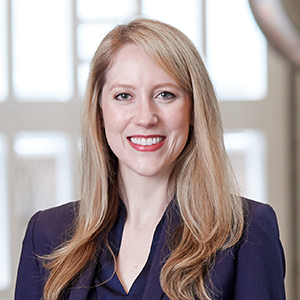
Madison Morrow
Associate, Parker Hudson Rainer & Dobbs LLP
Madison Morrow is an associate in the Commercial Finance practice group at Parker, Hudson, Rainer & Dobbs LLP. Madison primarily works with national and regional banks and other financial institutions in a wide range of commercial lending transactions, including syndicated and single-lender transactions, with a particular emphasis on asset-based lending. She focuses on the negotiation, documentation, and administration of transactions in a variety of industries and has experience with acquisition financing, healthcare financing and cross-border transactions. Madison also serves as the Chair of the Associates Committee at her firm, which was formed to represent the interests of associates in a variety of subject matters, including collaboration with firm management, supporting professional development opportunities for associates, and fostering community among associates.
Madison earned her J.D. from Wake Forest University School of Law in 2016, where she graduated cum laude and served as articles editor of the Wake Forest Law Review. Madison received her B.A. from Vanderbilt University in 2013.
How do you define a good leader?
A good leader is someone who promotes a collaborative approach and can delegate efficiently and effectively, all while maintaining a broader vision of an ultimate goal. They care about the task at hand as well as the people they are leading, and they are willing to take ownership and responsibility of the work product. Lastly, a good leader treats others with respect—even during the long hours, late nights, and the inevitable moments of frustration. We’ve all been tired and overworked from time to time, but I think that a good leader has the ability to remain calm and guide others towards achieving a goal, even when overwhelmed themselves.
What advice do you normally give to the junior talent you mentor?
I like to encourage mentees to ask questions and use each new assignment as an opportunity to learn. This is how you add to your toolbox and grow your knowledge of finance and your legal skillset. Do not be overwhelmed simply because you do not know everything or because you make a mistake! No one knows everything and recognizing that lack of knowledge is actually empowering. You need to do the research, educate yourself and ask the right questions. Incrementally, you will expand your toolbox so the next time that you are faced with an assignment or issue, you can draw upon your prior learning experience to see if you have gained the knowledge to address it. In my opinion, the best attorneys remain curious and eager to learn throughout their career.
What career trajectory would you like to be on?
I worked with a partner who encouraged me and other young attorneys to view the practice of law in three stages: (1) scrivener, (2) lawyer, and (3) counselor. These stages represent the progression of a legal practice. Starting out as a young attorney, you are drafting a lot and taking on the less glamorous tasks. But these should be viewed as opportunities to learn—not to merely act as a scribe, but as a means to build your skillset and become an adept drafter. Over time, you will enter the “lawyer” phase, gaining experience and deepening your substantive knowledge of your practice area. And then, after developing a deep substantive knowledge and a breadth of experience, you will be able to act as a trusted counselor and provide nuanced advice to clients based on the foundation you have built. I have taken this trajectory to heart; and while I am still refining my practice in the scrivener and lawyer stages, I hope someday to reach the level of counselor supported by a long career in the practice of secured lending.
What is the best professional advice you have been given and how have you implemented it?
Some great advice I have received is that although skills and substantive knowledge are important to a profession, interpersonal skills are equally important. Being able to communicate well, and respectfully, makes it easier to negotiate effectively with opposing counsel, talk through important points with clients, and maintain a network of professional relationships that will serve you throughout your career. I try to implement examples of good relationship building set by others, in particular more senior attorneys, in my day-to-day practice.
Professional Development Courses
- Live online classes for ABL and Factoring professionals
- On Demand classes in Appraisals, Factoring, Legal, Workout & Bankruptcy
Learn More

.jpg?sfvrsn=f1093d2a_0)